If you’re thinking about getting a budgie or other type of parakeet, you’ll obviously have to gain some knowledge on what these birds can and can’t eat.
Feeding a diet of exclusively seed used to be the norm, but many parrot keepers have now realized that their birds need something a little more nutritious and less fatty than seeds.
Fresh veggies are a perfect staple for parakeets and you should ideally be feeding them every day. But what vegetables can parakeets eat? Which are best avoided? Keep reading to find out all about veggies for your ‘keets!
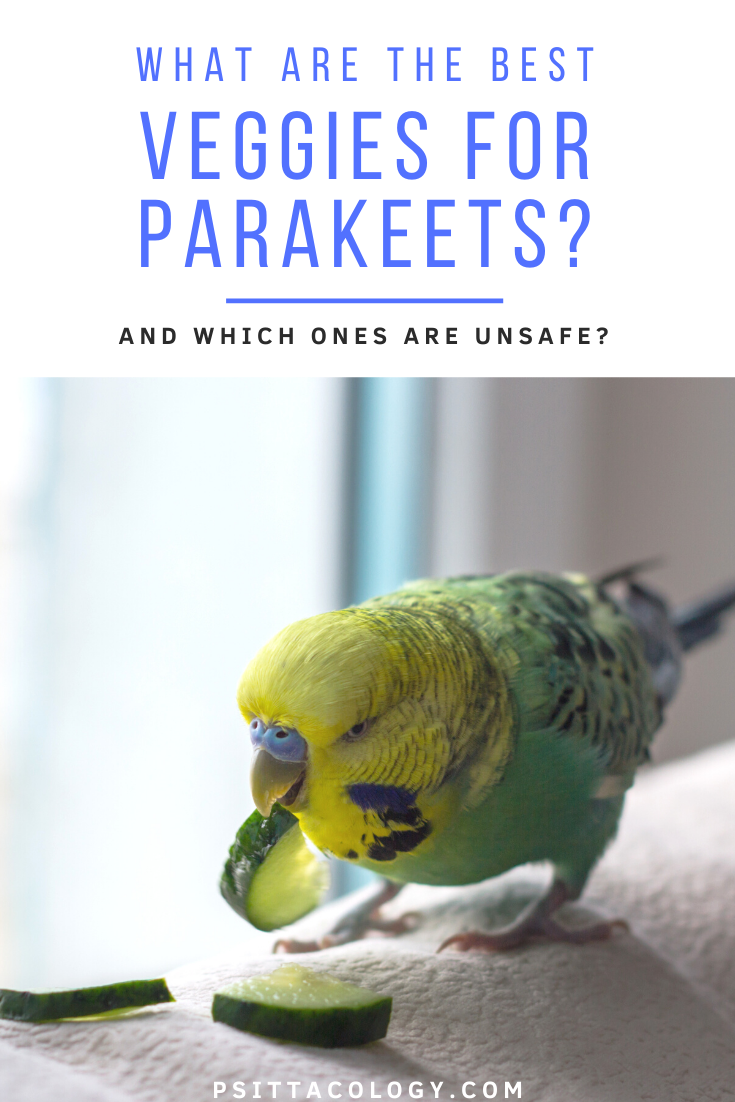
Can parakeets eat tomatoes?
Pieces of ripe tomato should be fine for your parakeet to eat. ? Do keep in mind that tomatoes are quite acidic, so don’t overfeed them just to avoid the slight chance of stomach irritation or even ulcers.
Unripe tomato should also be skipped as should tomato leaves (and those of all nightshade plant species), which are toxic.
Can parakeets eat celery?
Celery is actually a big favorite for many parrots, which seem to enjoy the crunchy texture.
It’s not exactly the most nutritious vegetable and the high water content can lead to very runny poops if the bird eats large quantities, but that doesn’t mean you can’t feed a piece here and there.
Note: Some sources don’t recommend feeding celery leaves, not clarifying exactly why they would pose a threat. Many other parakeet owners report no issues. Most parrots actually love celery leaves so we see no reason not to feed them.
Can parakeets eat cucumber?
Yup! And leave the skin on, since the rest of this vegetable is not very nutritious (do wash it beforehand).
Again, this is an option that’s low in nutrients and high in water content so it shouldn’t make up a large percentage of your bird’s diet. However, that doesn’t mean they won’t enjoy snacking on it!
Note: As with celery leaves (mentioned above), some sources report cucumber seeds are not safe for parakeets but don’t cite scientific sources. Many other parrot enthusiasts have never noticed any issues. As such, we see no reason at this time to specifically remove cucumber seeds.
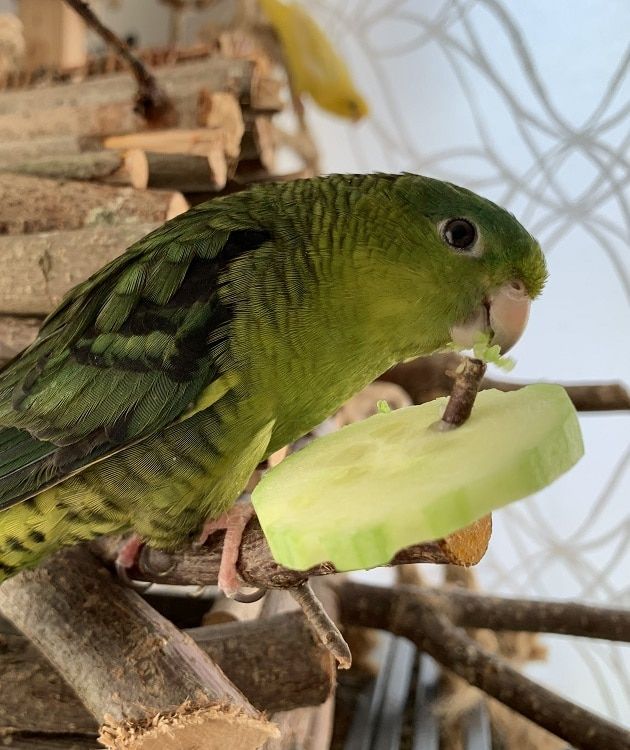
Can parakeets eat lettuce?
There are many different types of lettuce out there and all of the ones you can buy for human consumption should also be safe for budgies and other parakeets. The best types of lettuce for parakeets are dark-leaved and not crunchy: they contain the greatest concentration of nutrients.
Watery types like iceberg can also be offered but they don’t help much in the way of getting calories and energy into your bird. Since a lot of parakeets do love crunchy things, iceberg lettuce is a good option especially if your bird isn’t that enthusiastic about veggies yet. It can be a good bridge to cultivate a love for greenery.
Can parakeets eat broccoli?
You betcha! Raw broccoli (or steamed/boiled with no added salt) is super nutritious and the perfect addition to your parakeet’s diet. It can sway even some of the most hardcore veggie refusers, since the florets kind of resemble little green seeds.
Of course, bimi (stem broccoli) is also perfectly good for parakeets to eat. The same applies to cauliflower as well as the more uncommon green broccoflower and romanesco.
Can parakeets eat carrots?
Yes, and you don’t even have to remove the tops, which some parakeets will go crazy for!
If your bird isn’t interested in carrots at first, try offering them in different manners: you can try finely chopped, slices, cooked/steamed and then mashed or grated. Sometimes it just takes a while to find out how your bird likes to eat a certain veggie.
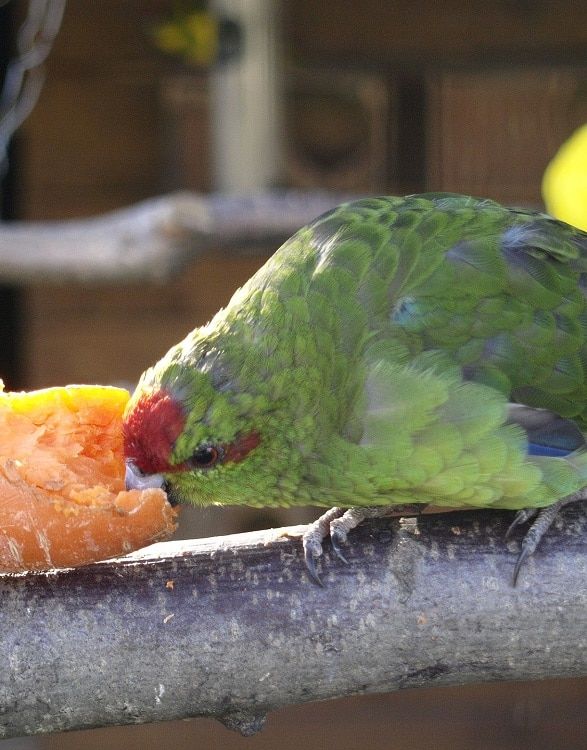
Can parakeets eat spinach?
Yes, they can definitely be fed a couple of spinach leaves from time to time. As a dark leafy green, spinach is packed with nutrients!
Do keep in mind that large amount of it might cause issues with calcium uptake, so don’t offer bags of the stuff at once.
Can parakeets eat bell peppers?
Yup, though keep in mind that white budgies might end up looking like they were just at the scene of a crime if they eat red bell pepper.
If you decide to use a bell pepper for your own dinner, you could consider giving the heart (containing the seeds) to your parakeet. They love the seeds and that way nothing goes to waste. You could even sprout the bell pepper seeds for a few days before feeding them.
Since bell peppers are members of the nightshade family (like tomatoes) it’s recommendable to remove any pieces of the stem before feeding this vegetable.
Can parakeets eat cabbage?
Like spinach, cabbage is another suspect when it comes to vegetables that might interfere with the uptake of calcium in your parakeet’s body if you feed it too often.
Since birds need plenty of calcium to grow feathers and lay eggs, a lack of this nutrient can be dangerous. As such, you can feed cabbage but don’t do so on a daily basis!
Can parakeets eat corn?
Yes and many of them adore it! Give them raw or (unsalted) boiled corn on the cob or remove the kernels and serve them in the bird’s food bowl.
Do make sure you don’t offer fresh corn on a daily basis, since it’s relatively hard to digest for birds and the sugar content is quite high.
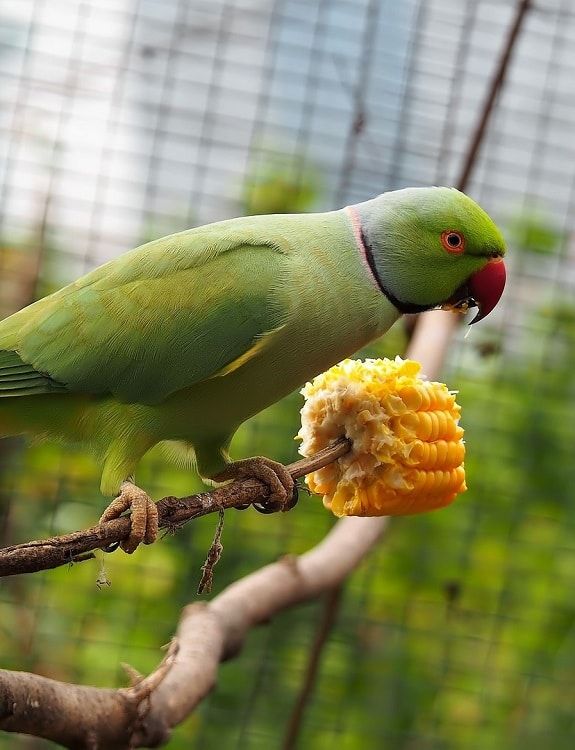
Other vegetables for parakeets
- Other leafy greens: Bok choy, kale, chard, etc. all make great options and contain lots of nutrients to keep your parakeet healthy.
- Peas, snap peas and snow peas are all fine options.
- Green beans are good and some birds love digging the little peas out. Other beans (like kidney beans, black beans, etc.) are a bit riskier. They should never be given in their dried form and can only be offered in a thoroughly boiled state.
- Hot peppers are a funny one. We’ve spotted them on some “no-no” lists, but they are actually perfectly safe. In fact, your parakeet could eat the hottest peppers, ones that would make you cry in an instant, without any issue.
This is because peppers have evolved to produce a toxin (capsaicin) that birds are insensitive to. After all, the plant needs birds to spread the seeds by eating the pepper!
- Beets are a healthy but messy option. Don’t toss the greens either, give them a wash and they make a great parakeet snack.
- Squash or pumpkin are also perfectly fine, so offer your parakeet some leftovers after you’re done carving your Halloween pumpkin.
- Radishes are a good option, as are radish sprouts.
- Zucchini is actually probably a better option than cucumber. It’s less watery and more nutritious, though the stems should be removed.
- Fennel is a big favorite for its leaves, but any part can be offered.
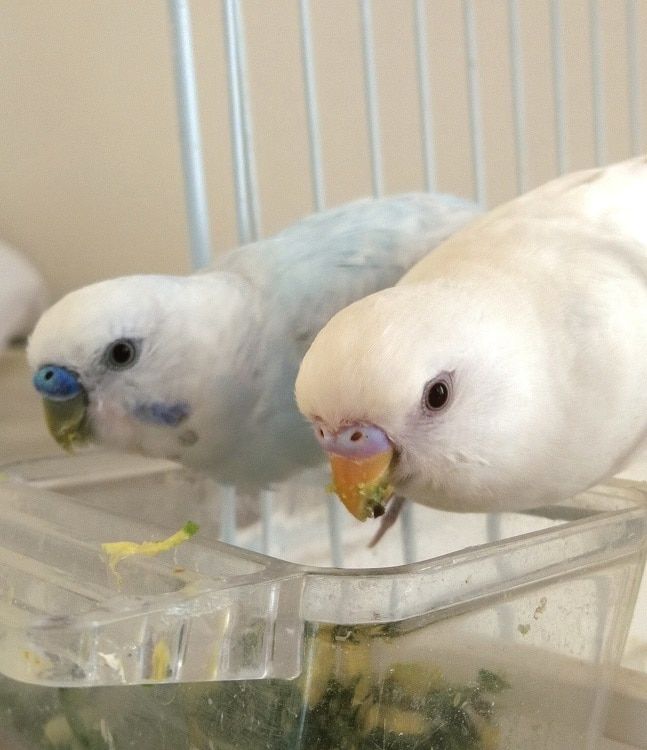
Vegetables to avoid
- Avocado is really a fruit, but let’s still mention it. Highly toxic to parrots, this is one of the prime foods that every ‘avoid’ list for your parakeet should mention.
- Garlic and especially onion are also big no-nos despite them being so beneficial to humans. Even a very small amount of any plant from the Allium family is toxic and that includes but is not limited to onion and garlic. Leek, chives, shallots and spring onion are some of the other main suspects and should be avoided.
- Tomatoes (unripe/green) can cause digestive issues, so stick to ripe tomatoes instead.
- Asparagus is a vegetable that some feed, while others have deemed it suspicious due to a compound that it contains called Asparagin. This is rumored to cause digestive problems but there doesn’t appear to be much of a consensus on whether asparagus should really be avoided.
What do parakeets eat (aside from veggies)?
As mentioned in the intro, more and more parakeet owners are realizing that their birds need more than just a diet of cheap seed.
While many species, especially budgies, do eat seeds in their natural habitat, they also eat other things. The seeds they get are not always dried and they also eat grasses, sprouts and really anything edible they come across (even the occasional unlucky insect!).
Seeds make a great diet for wild parakeets because they are high in calories, offering the energy the birds need for their active lifestyle. In our homes even fully flighted and active birds will never reach the exercise levels that wild ones will, so they can easily become obese on a diet of seeds. This can result in grave health issues.
So what should your parakeet be eating? Well, as many different things as possible, really. Variation is the key to a healthy diet for almost all creatures and it’s no different for parrots. Try offering a diet that consists of (but is not limited to):
- Fresh vegetables. As you’ve just found out, there are options galore. It can take parakeets a long time to adjust to veggies but stay persistent.
- Fresh fruits. You can find suitable fruits in the article on fruits for parakeets.
- Commercial bird foods like a high quality pellet. Do read the ingredient list as some are filled with sugars and low quality filler ingredients.
- Seeds. Yes, you can still feed them! It just shouldn’t be the main part of your parakeet’s diet. Go for a high quality mix.
- Unsalted boiled rice, pasta, couscous and other grain-based foods.
- Sprouts like microgreens, bean sprouts, sprouted bird seed, lentils, vegetable seeds…
- Weeds! Many common garden weeds like dandelion leaves, clovers and plain old grass (especially grasses that are in flower) are very natural options. The same goes for most common garden herbs, although some are best fed in moderation.
- Other: Boiled egg, nuts and more can be fed in moderation.
Note: Of course your bird should also always have access to multiple sources of fresh water. A mineral block is also useful to keep in the cage.
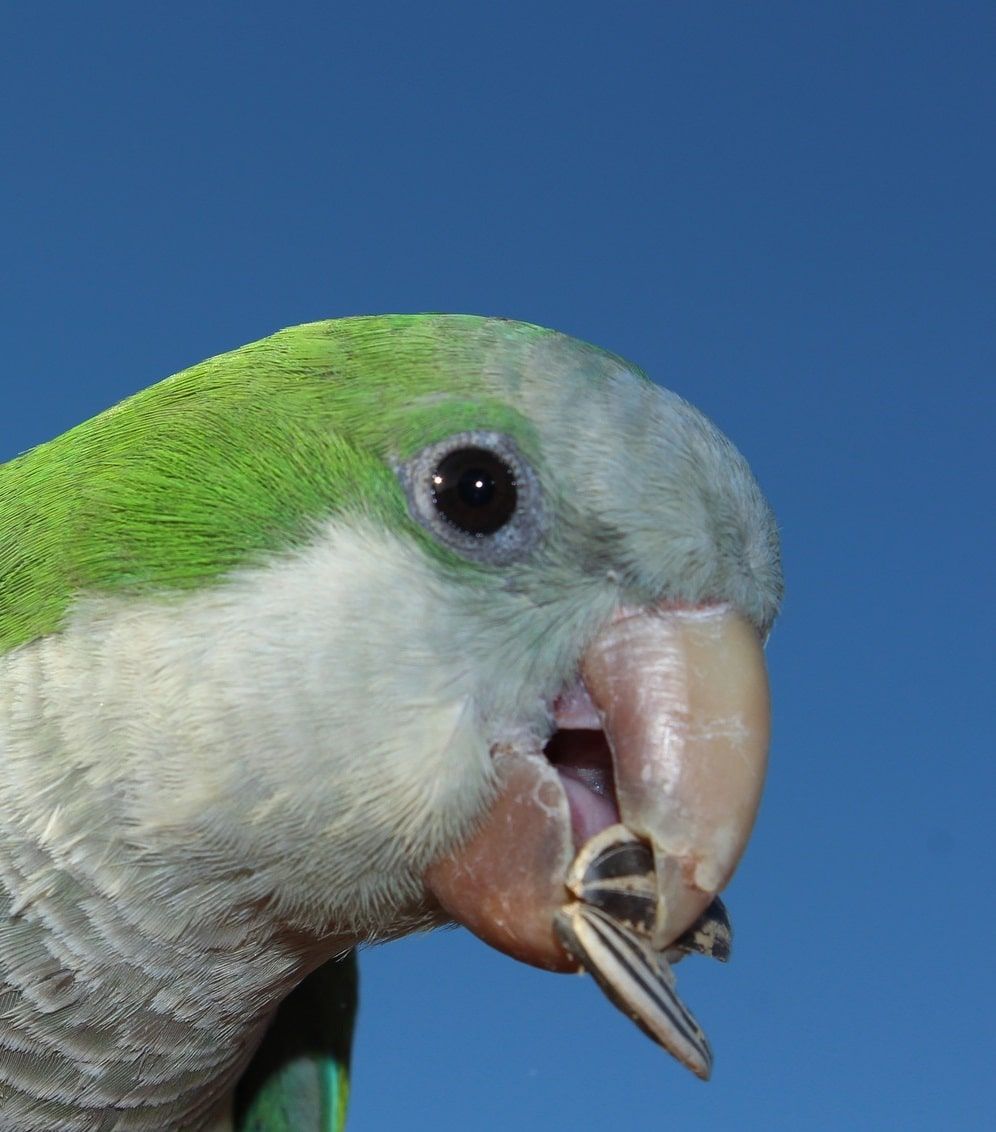
If you have any more questions about safe vegetables for parakeets or if you want to share your own experiences with putting together a healthy diet for your ‘keet, don’t hesitate to leave a comment below!
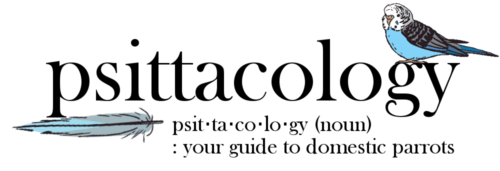
One thing I found that my little Dewey goes bat bird crazy over are the tall forked grass seed stalks you see everyday in your yard. Soon as I come in with a handful he’s like “oh boy oh boy oh boy! Tweet(treat) tweet tweet!! Gimmie some of that good stuff! He’s quite a character.
Yes absolutely! If you have grasses growing in your yard, your parakeet will go crazy for pretty much any kind. I always pick them in pesticide-free spots for a little enrichment 🙂
I have fed raw sweet potato (sliced) to my budgerigars for years and it is a welcomed treat. It does stain them a bit but not as badly as carrots.
And, as Mary mentioned above, my budgies absolutely love the green foxtail grass seed heads that sprout along the margins of my lawn and farm field.
Good one, I’ll add that to the list. They love colorful foods and sweet potato is very healthy anyway. Mine love grasses as well! My mother cultivates organic millet and other grasses to dry and use as home décor and they LOVE it when she gives me some as a treat for them. 🙂
I just brought home two four month old parakeets. I’m so excited to bond with them. Thank you for great infomation!
All the best, I’m sure it’ll go great! You can check out the guide on taming a parrot if you haven’t already for more help 🙂 Good luck.